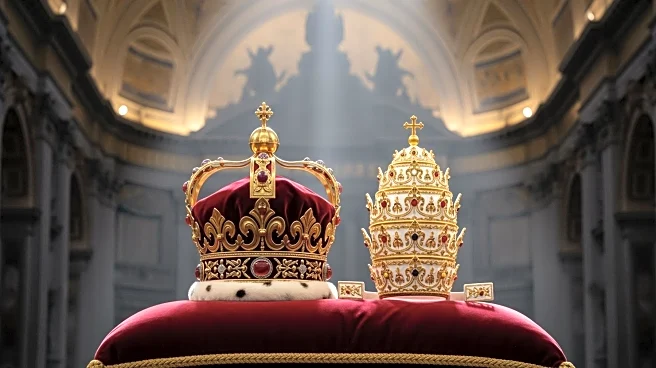What's Happening?
King Charles III has made history by becoming the first head of the Anglican Church to publicly pray with a Pope, marking a significant step towards unity between the Church of England and the Catholic Church. This event took place in the Sistine Chapel,
where King Charles and Queen Camilla participated in an ecumenical service alongside Pope Leo XIV and the Anglican Archbishop of York. The service, which included hymns from both Anglican and Catholic traditions, symbolizes a move towards greater cooperation between the two churches, despite longstanding theological differences, such as the ordination of female priests. This meeting comes nearly half a century after the Reformation, which saw the Church of England split from the Vatican.
Why It's Important?
The joint prayer between King Charles III and Pope Leo XIV is a landmark event in the history of Christian relations, highlighting a potential shift towards reconciliation and collaboration between the Anglican and Catholic churches. This development could pave the way for increased dialogue and cooperation on shared concerns, such as environmental stewardship, as emphasized by the service's theme of 'Care for Creation.' While significant theological differences remain, this event underscores a mutual desire to find common ground and work together on global issues. The meeting also serves as a diplomatic gesture, potentially strengthening ties between the United Kingdom and the Vatican.
What's Next?
Following this historic event, both churches may explore further opportunities for collaboration on social and environmental issues. King Charles is set to receive a new title at St. Paul’s Outside the Walls, symbolizing spiritual fellowship, while Pope Leo XIV has been given a reciprocal title. These exchanges of titles could signify a deepening of relations between the two institutions. Additionally, the British Royal Family hopes this visit will shift public focus away from domestic controversies, such as the ongoing scrutiny of Prince Andrew's ties to Jeffrey Epstein.
Beyond the Headlines
This event may have broader implications for interfaith dialogue and the role of religious institutions in addressing global challenges. The emphasis on unity and cooperation could inspire similar initiatives among other religious groups, fostering a more collaborative approach to issues like climate change and social justice. Furthermore, the public nature of this meeting highlights the evolving role of religious leaders in diplomacy and international relations.















